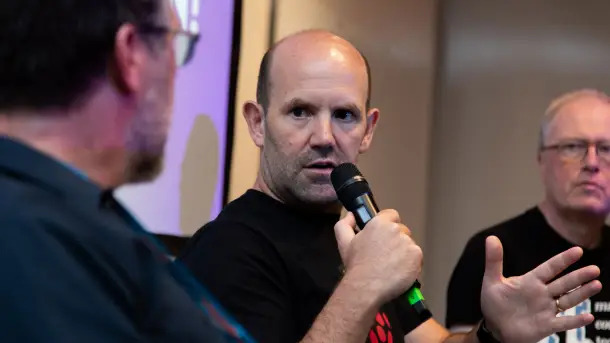Future Raspberry Pi models will feature more USB-C functionality and UEFI firmware. The company's own Linux distribution will continue to be maintained.

Raspberry Pi CEO Eben Upton in conversation with Daniel Bachfeld (left) and Christof Windeck at Maker Faire 2025.
What's next for the Raspberry Pi single-board computer? Eben Upton, CEO of Raspberry Pi Plc., answered numerous questions on this topic on August 23rd at Maker Faire Hannover 2025. He spoke with Daniel Bachfeld, editor-in-chief of Make: magazine, and Christof Windeck from c't. The discussion began with the cost: Upton acknowledged that the current Raspberry Pi 5, with a starting price of around €50 for the 2GB version, is significantly more expensive than the Raspberry Pi 4. He explained that considerably more powerful chips, as well as more and faster I/O ports like PCI Express, simply cost more, in addition to general price increases. However, he promised that future Raspberry Pi models would remain affordable.
Eben Upton initially dodged the question about additional USB-C features. He explained at length that integrating complex USB-C functions was time-consuming, expensive, and prone to errors. Sometimes additional chips were needed to protect the USB port against fatal errors – and these not only cost money but also took up valuable space on the circuit board, which is intended to retain its payment card-sized form factor.
He also mentioned advantages of USB-C, such as the ability to connect displays instead of using HDMI or Micro-HDMI. However, this isn't expected in the upcoming Raspberry Pi 6, but rather in the generation after next. He didn't mention a release year, but based on past experience (Raspberry Pi 3: 2016, Raspberry Pi 4: 2019, Raspberry Pi 5: 2023), a Raspberry Pi 6 isn't expected until the second half of 2026 at the earliest, and a Raspberry Pi 7 probably not until 2030.
UEFI BIOS
According to Upton, the Raspberry Pi developers are already working on UEFI-compatible firmware. This would simplify booting different Linux distributions on a Raspberry Pi. The potential Raspberry Pi UEFI is intended to be compatible with the specifications of the ARM Base System Architecture (BSA). Such UEFI firmware is available for download for the Raspberry Pi 4, allowing certain versions of Windows 10 to boot. For the Raspberry Pi 5, there is rudimentary UEFI support from other developers.
 Upton also emphasized, however, that they intend to stick with their own Linux distribution, Raspberry Pi OS, for the foreseeable future. It offers the most comprehensive support for Raspberry Pi hardware and makes it easier to maintain projects across multiple Raspberry Pi generations. With Raspberry Pi OS, they also pay attention to memory requirements so that desktop applications can still be used effectively even on Raspberry Pi versions with only 2 GB of RAM.
Upton also emphasized, however, that they intend to stick with their own Linux distribution, Raspberry Pi OS, for the foreseeable future. It offers the most comprehensive support for Raspberry Pi hardware and makes it easier to maintain projects across multiple Raspberry Pi generations. With Raspberry Pi OS, they also pay attention to memory requirements so that desktop applications can still be used effectively even on Raspberry Pi versions with only 2 GB of RAM.
Raspberry Pi markets and chip development
Raspberry Pi Plc. and Eben Upton himself have been frequent guests at German trade fairs and events such as Maker Faire Hannover in recent years. After the USA, Germany is the most important market for the single-board computers and accessories. However, the company now generates more than 70 percent of its revenue from commercial customers (Original Equipment Manufacturers, OEMs). These OEMs integrate Raspberry Pi components into their own devices, such as the Raspberry Pi Compute Modules (CM), the RP2040 and RP2350 microcontrollers, and the Pico boards (Pico, Pico W, Pico 2, Pico 2 W) equipped with them. Upton meets OEM manufacturers, for example, at the Embedded World trade fair in Nuremberg.
Sales to industrial customers are intended to help further develop the Raspberry Pi product range for hobbyists and the education sector. Raspberry Pi Plc. employs around 140 people and aims to attract and retain talented individuals with good pay and career advancement opportunities.
Chip development
Upton holds an MBA, but his PhD in Computer Science comes from Cambridge, and his passion lies in chip development. He said it's always exciting when the first prototypes of a new chip come off the production line. Often, things go wrong – making the success of the first chip all the more rewarding. In the interview, he also addressed the risks associated with integrating third-party functional blocks into one's own chips. He considers the RISC-V cores in the RP2350 a success, but it remains unclear when RISC-V technology will be able to replace the ARM cores in Raspberry Pi single-board computers.



 Upton also emphasized, however, that they intend to stick with their own Linux distribution, Raspberry Pi OS, for the foreseeable future. It offers the most comprehensive support for Raspberry Pi hardware and makes it easier to maintain projects across multiple Raspberry Pi generations. With Raspberry Pi OS, they also pay attention to memory requirements so that desktop applications can still be used effectively even on Raspberry Pi versions with only 2 GB of RAM.
Upton also emphasized, however, that they intend to stick with their own Linux distribution, Raspberry Pi OS, for the foreseeable future. It offers the most comprehensive support for Raspberry Pi hardware and makes it easier to maintain projects across multiple Raspberry Pi generations. With Raspberry Pi OS, they also pay attention to memory requirements so that desktop applications can still be used effectively even on Raspberry Pi versions with only 2 GB of RAM.


